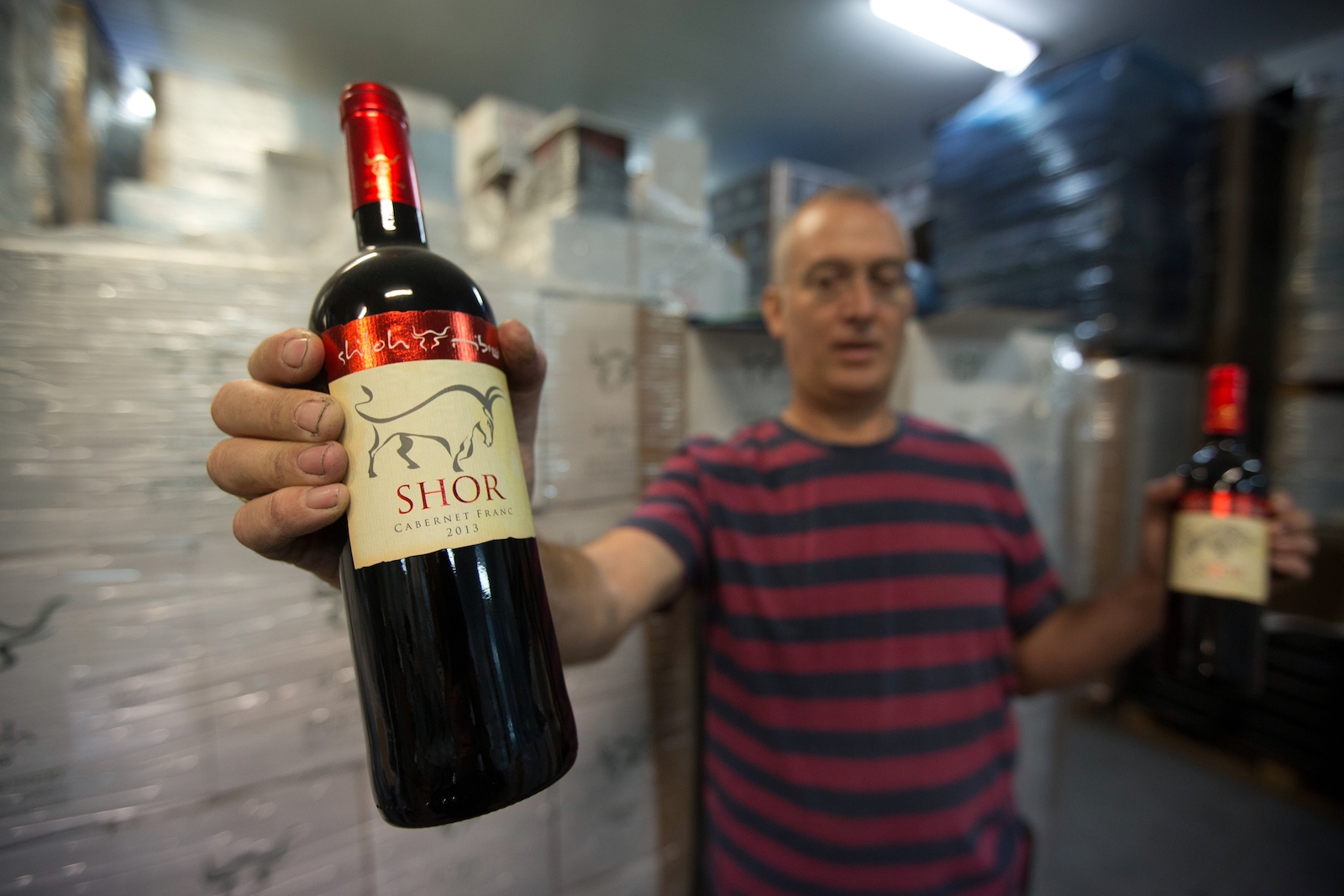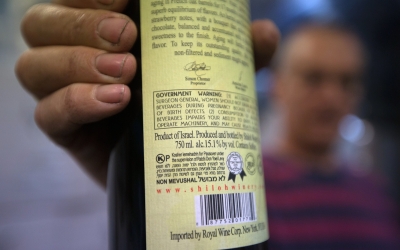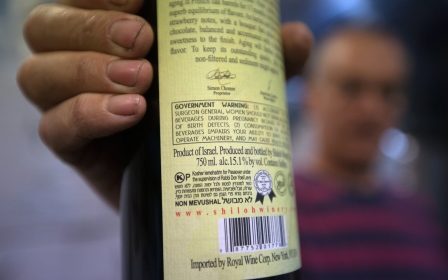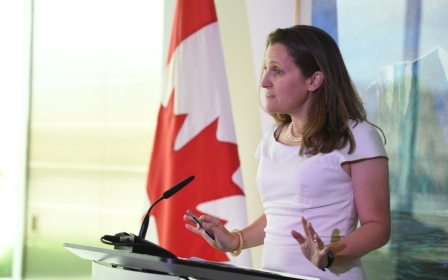Canada appeals court ruling against settlement wines labelled 'Product of Israel'

The Canadian government is appealing a court's recent decision against Israeli settlement wines, which it said should no longer be labelled "Product of Israel" when sold in Canada.
The Federal Court of Canada found on 29 July that "Product of Israel" labels on wines made in Jewish-only settlements in the occupied Palestinian territories are "false, misleading and deceptive".
The court said it was "unreasonable" to continue selling the wines under that label, ordering the Canadian Food Inspection Agency (CFIA) to find an alternative - a decision that was hailed by pro-Palestine advocates across the country.
But Canadian media first reported over the weekend that Prime Minister Justin Trudeau's government planned to appeal the ruling, amid pressure from pro-Israel lobby groups.
In an email to MEE on Monday, the CFIA said that after carefully reviewing the court's decision, the government "has decided to appeal".
New MEE newsletter: Jerusalem Dispatch
Sign up to get the latest insights and analysis on Israel-Palestine, alongside Turkey Unpacked and other MEE newsletters
"As a federal regulator, the Canadian Food Inspection Agency takes seriously its mandate to verify that food products and labels are truthful and not misleading. This is an important part of consumer protection," a spokesperson said.
The government filed a notice of appeal on 6 September, the spokesperson said.
The CFIA rejected the court's assertion that it failed to consider the Canadian Charter of Rights and Freedoms when the agency allowed Israeli settlement wines to be labelled "Product of Israel".
"The Government is of the view that the Complaints and Appeals Office considered and weighed relevant Charter values and the statutory and regulatory objectives in arriving at its decision," the CFIA said.
The Charter of Rights and Freedoms is a set of rights, including free speech, that are guaranteed under the Canadian constitution.
In its ruling, the court cited citizens' right to boycott wines produced in Israeli settlements.
"Identifying Settlement Wines incorrectly as 'Products of Israel' inhibits the ability... to express their political views through their purchasing choices, thereby limiting their Charter-protected right to freedom of expression," it stated.
In its appeal, the federal government is also challenging whether the court applied a stricter standard of review than is necessary at the CFIA's Complaints and Appeal Office, the agency's spokesperson said.
While pro-Israel group B'nai Brith Canada welcomed the government's plan to appeal as "the only reasonable option", Palestine advocates decried the decision as politically motivated.
A federal election will be held in Canada next month and Trudeau's biggest challenge for re-election comes from the right-wing Conservative Party, which is staunchly pro-Israel.
"Sadly, the appeal looks to be solely for political reasons –to appeal to certain voters and lobbyists– rather than to pose any legitimate challenges to the judge's interpretation of Canadian law," said Corey Balsam, national coordinator of Independent Jewish Voices-Canada, a Jewish advocacy group that supports Palestinian rights.
"By deciding to appeal, not only is the government betraying the rights of Canadian citizens to make conscientious decisions about the products they choose to consume, but it is defending Israel's illegal settlement project in the West Bank," Balsam said in a statement on Monday.
Farida Deif, the Canada director at Human Rights Watch, also criticised the appeal.
"How Ottawa justifies maintaining a 'product of Israel' label on wine clearly made in illegal West Bank settlements is beyond comprehension," she wrote on Twitter.
"Canadian consumers deserve better from their government."
'Just and proper' ruling
The settlement wines case first drew international headlines in 2017, when Canadian-Jewish activist David Kattenburg filed a complaint with the alcohol board in the province of Ontario against the labelling of two specific Israeli settlement wines.
One wine was made by Psagot Winery Ltd, which operates in the Jewish-only settlement of the same name near Ramallah in the occupied West Bank, while the other was made by Shiloh Winery Ltd in the northern West Bank.
Kattenburg argued that labelling Israeli settlement wines as "Product of Israel" misleads Canadian consumers and "amounts to ... an acknowledgement and endorsement of Israel's de facto annexation of the settlements".
'By deciding to appeal, not only is the government betraying the rights of Canadian citizens to make conscientious decisions about the products they choose to consume, but it is defending Israel's illegal settlement project in the West Bank'
- Corey Balsam, Independent Jewish Voices-Canada
But the Canadian government has defended the labels by pointing to the Canada-Israel Free Trade Agreement (CIFTA), which states that Israeli territory is defined as "the territory where its [Israel's] customs laws are applied".
In place since 1997, CIFTA outlines tariff-free imports and exports between Israel and Canada.
In mid-August, Amnesty International Canada and Michael Lynk, the United Nations' special rapporteur for human rights in the occupied Palestinian territories, urged Ottawa to accept the federal court's decision.
"This ruling is just and proper," they said in a letter to three government ministers.
"It correctly accepts the political and legal fact that the West Bank is not part of Israel, and that Israel cannot claim that goods produced in its settlements come from 'Israel'."
They also urged the federal government "to review and remove" any provisions in CIFTA that allow goods and services from Israeli settlements to enter Canada, pointing to the destructive effects Israel's settlement project has had on Palestinian rights.
"Fulfilling both of these steps would enable Canada to fulfill its legal obligation to support the use of international law and human rights principles to resolve conflicts and protect the vulnerable and the afflicted," they said.
Middle East Eye delivers independent and unrivalled coverage and analysis of the Middle East, North Africa and beyond. To learn more about republishing this content and the associated fees, please fill out this form. More about MEE can be found here.





